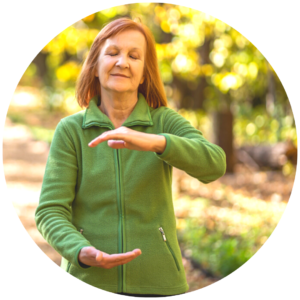Living Well with Parkinson’s
As Professor Bas Bloem says in his foreword to the Every Victory Counts manual, now is a time for hope for people living with Parkinson’s. From innovative new treatments to increasing awareness of exercise’s neurological benefits to encouraging advocacy initiatives, the Parkinson’s field is rapidly changing for the better. You don’t have to wait for the future, though, to begin living well with Parkinson’s. Begin today.
In this collection of resources that complement information in Chapters 12-16 of the Every Victory Counts manual, we share what you can do, starting right now, to live well with Parkinson’s.

Positivity Extends Life
It’s a bold claim: positive thinking and positive social influences can improve your mental and physical health. But as surprising as it may seem, there’s a broad base of scientific evidence behind that claim. In this article, we explore how self-efficacy and self-care can help you live your best life with Parkinson’s.
Holistic and Supportive Care for People With Parkinson’s
If you’ve been living with Parkinson’s for any length of time, you’ve probably heard the terms holistic care, supportive care, or palliative care. But you may not know what they mean when it comes to your care, now and in the future. In this conversation, movement disorder specialist Dr. Christopher Tarolli talks with us about holistic care and how it is ideal for people living with Parkinson’s.
Social Connection and Parkinson’s
Social isolation is a rising concern in the general population, but it is even more common for those who also live with chronic illnesses such as Parkinson’s. The psychological and physical effects of social isolation can be severe. It can exacerbate your motor and non-motor symptoms, put you at risk for developing other health problems, increase your chances of experiencing depression and anxiety, accelerate cognitive decline, and decrease your quality of life. In this webinar, Dr. Al Condeluci explains the key concepts and importance of social capital, the difference between social isolation and loneliness, the biology of social isolation, and more.
How Long Can I Keep Driving if I Have Parkinson’s?
Many people living with Parkinson’s continue to drive safely for many years after their diagnosis. However, because no person experiences Parkinson’s in the same way, the following question should be revisited on a regular basis when evaluating driving with Parkinson’s: How can I ensure my safety and the safety of others on the road? In this article, we offer answers to that important question.
Living Well Calendar
Daily prompts from our Living Well Calendar will keep you dancing, reading, socializing, writing, playing, and taking action to live well with Parkinson’s every day. Have fun with it. Invite a friend to join you. Live better with Parkinson’s today and every day.
HOW CREATIVITY CAN HELP YOU LIVE WELL
“When I was diagnosed with Parkinson’s, I found myself facing unexpected territory and wondered how I was supposed to live well. I focused on the bright side: Parkinson’s opened the door for me to retire early and spend more time with family and friends. And, once retired, I created a roadmap for this Parkinson’s territory, and now I start each morning at what I call the ‘crossroads of health and art.’” Read how Lorraine Wilson builds creativity into her everyday life with Parkinson’s and finds joy in her new crossroads.
Explore More Living With Parkinson's Resources
- How to Build Resilience While Living with Parkinson’s
- How Sunlight Can Help You Live Well with Parkinson’s
- Take Your Parkinson’s for a Spin in the Great Outdoors
- A Parkinson’s Journey: The Art of Mindful Pivoting
- The Upside of “Negative” Emotions in Dealing with Parkinson’s
- A Grounding Exercise for Parkinson’s
- Keepin’ On: Living Well with Parkinson’s
- How Service Dogs Can Support People with Parkinson’s
- Resiliency as a Tool for Living Well with Parkinson’s
- Parkinson’s and Mental Health: Integration Is Key
- Tips for More Expressive Communication for People with Parkinson’s
- Ask the Parkinson’s Expert: Maintaining Relationships with Davis Phinney
- You Can’t Exercise Your Way out of Poor Social Connections
- A Trike for the Parkinson’s Community of Denver
- Moments of Victory® – Jennifer Parkinson Discovers the Power of Community
- How to Reduce Social Isolation While Living with Parkinson’s
- Sexuality and Intimacy for People with Parkinson’s and their Care Partners
- You’ve Got a Friend in Me: Tales from Two Davis Phinney Foundation Ambassadors
- Insurance for People with Parkinson’s
- Financial Wellness and Parkinson’s
- Medicare Coverage and Parkinson’s
- Can I Get Disability Benefits Now that I Have Parkinson’s?
- Advance Directives and Parkinson’s
- Expert Advice on Workplace Issues
- How to Work Full-Time and Live Well with Parkinson’s
- Working Full-Time with Young Onset Parkinson’s
- Palliative Care for Parkinson’s
- How to Live Well with Parkinson’s for the Newly Diagnosed
- Ask the Parkinson’s Expert: Everyday Habits to Live Well with Davis Phinney
- I Have Parkinson’s and I’m Okay
- The Holy Grail of Living Well with Parkinson’s
- Innovations in Parkinson’s: Where Are We Now?
- 3 Ways to Be a Parkinson’s Advocate
- Steve Emerson, Conquering a Perfect Storm
EVERY VICTORY COUNTS
Don’t have the Every Victory Counts manual yet? Click here to get your complimentary copy.







